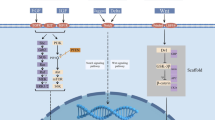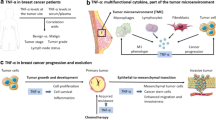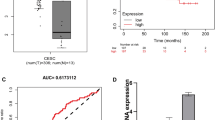Abstract
Background
Ovarian cancer (OC) is the second most commonly seen cancer in the US, and patients with OC are commonly diagnosed in the advanced stage. Research into the molecular mechanisms and potential therapeutic targets of OC is becoming increasingly urgent. In our study, we worked to discover the role of TRIM44 in OC development.
Objective
This study explored whether the overexpression of TRIM44 mediates the NF-kB pathway to promote the progression of OC.
Methods
A TRIM44 overexpression model was constructed in SKOV3 cells, and the proliferation ability of the cells was detected using the CCK-8 assay. The migration healing ability of cells was detected using cell scratch assay. Cell migration and invasion were detected using Transwell nesting. TUNEL was applied to detect apoptosis, and ELISA and western blot were used to detect the expression of NF-κB signaling pathway proteins. The pathological changes of the tumor tissues were observed using HE staining in a mouse ovarian cancer xenograft model. Immunofluorescence double staining, RT-PCR, and western blot were used to determine the expression of relevant factors in tumour tissues.
Results
TRIM44 overexpression promoted the proliferation, migration, and invasion of SKOV3 cells in vitro and inhibited apoptosis while enhancing the growth of tumours in vivo. TRIM44 regulated the NF-κB signaling pathway.
Conclusions
TRIM44 overexpression can regulate the NF-κB signaling pathway to promote the progression of OC, and TRIM44 may be a potential therapeutic target for OC.




Similar content being viewed by others
Data Availability
The authors confirm that the data supporting the findings of this study are available within the article.
References
Alsafadi S, Tourpin S, Bessoltane N, Salomé-Desnoulez S, Vassal G, André F, Ahomadegbe JC (2016) Nuclear localization of the caspase-3-cleaved form of p73 in anoikis. Oncotarget 7:12331–12343. https://doi.org/10.18632/oncotarget.6329
Beale PJ, Rogers P, Boxall F, Sharp SY, Kelland LR (2000) BCL-2 family protein expression and platinum drug resistance in ovarian carcinoma. Br J Cancer 82:436–440. https://doi.org/10.1054/bjoc.1999.0939
Chen Y, Sun J, Ma J (2017) Proliferation and invasion of ovarian cancer cells are suppressed by knockdown of TRIM11. Oncol Lett. 14(2):2125–2130. https://doi.org/10.3892/ol.2017.6432
Crawford LJ, Johnston CK, Irvine AE (2018) TRIM proteins in blood cancers. J Cell Commun Signal 12:21–29. https://doi.org/10.1007/s12079-017-0423-5
Dai W, Wang J, Wang Z, **ao Y, Li J, Hong L, Pei M, Zhang J, Yang P, Wu X et al (2021) Comprehensive Analysis of the Prognostic Values of the TRIM Family in Hepatocellular Carcinoma. Front Oncol 11:767644. https://doi.org/10.3389/fonc.2021.767644
Deng B, Zhang S, Zhang Y, Miao Y, Meng X, Guo K (2017) Knockdown of Tripartite Motif Containing 28 suppresses the migration, invasion and epithelial-mesenchymal transition in ovarian carcinoma cells through down-regulation of Wnt/β-catenin signaling pathway. Neoplasma 64:893–900. https://doi.org/10.4149/neo_2017_611
Gilmore TD (1999) Multiple mutations contribute to the oncogenicity of the retroviral oncoprotein v-Rel. Oncogene 18:6925–6937. https://doi.org/10.1038/sj.onc.1203222
González-Martín A, Pothuri B, Vergote I, DePont CR, Graybill W, Mirza MR, McCormick C, Lorusso D, Hoskins P, Freyer G et al (2019) Niraparib in Patients with Newly Diagnosed Advanced Ovarian Cancer. N Engl J Med 381:2391–2402. https://doi.org/10.1056/nejmoa1910962
Inoue K, Slaton JW, Eve BY, Kim SJ, Perrotte P, Balbay MD, Yano S, Bar-Eli M, Radinsky R, Pettaway CA et al (2000) Interleukin 8 expression regulates tumorigenicity and metastases in androgen-independent prostate cancer. Clin Cancer Res 6:2104–2119
Kawabata H, Azuma K, Ikeda K, Sugitani I, Kinowaki K, Fujii T, Osaki A, Saeki T, Horie-Inoue K, Inoue S (2017) TRIM44 Is a Poor Prognostic Factor for Breast Cancer Patients as a Modulator of NF-κB Signaling. Int J Mol Sci 18(9):1931. https://doi.org/10.3390/ijms18091931
Kimura T, Jain A, Choi SW, Mandell MA, Schroder K, Johansen T, Deretic V (2015) TRIM-mediated precision autophagy targets cytoplasmic regulators of innate immunity. J Cell Biol 210:973–989. https://doi.org/10.1083/jcb.201503023
Kimura T, Mandell M, Deretic V (2016) Precision autophagy directed by receptor regulators - emerging examples within the TRIM family. J Cell Sci 129:881–891. https://doi.org/10.1242/jcs.163758
Koepke L, Gack MU, Sparrer KM (2021) The antiviral activities of TRIM proteins. Curr Opin Microbiol 59:50–57. https://doi.org/10.1016/j.mib.2020.07.005
Lai Y, Shen Y, Liu XH, Zhang Y, Zeng Y, Liu YF (2011) Interleukin-8 induces the endothelial cell migration through the activation of phosphoinositide 3-kinase-Rac1/RhoA pathway. Int J Biol Sci 7:782–791. https://doi.org/10.7150/ijbs.7.782
Li Q, Withoff S, Verma IM (2005) Inflammation-associated cancer: NF-kappaB is the lynchpin. Trends Immunol 26:318–325. https://doi.org/10.1016/j.it.2005.04.003
Li CG, Hu H, Yang XJ, Huang CQ, Yu XQ (2019) TRIM44 Promotes Colorectal Cancer Proliferation, Migration, and Invasion Through the Akt/mTOR Signaling Pathway. Onco Targets Ther 12:10693–10701. https://doi.org/10.2147/ott.s228637
Li W, Cui Z, Kong Y, Liu X, Wang X (2021) Serum Levels of S100A11 and MMP-9 in Patients with Epithelial Ovarian Cancer and Their Clinical Significance. Biomed Res Int 2021:7341247. https://doi.org/10.1155/2021/7341247
Liu S, Chen ZJ (2011) Expanding role of ubiquitination in NF-κB signaling. Cell Res 21:6–21
Liu S, Yin H, Ji H, Zhu J, Ma R (2018) Overexpression of TRIM44 is an independent marker for predicting poor prognosis in epithelial ovarian cancer. Exp Ther Med 16:3034–3040. https://doi.org/10.3892/etm.2018.6541
Liu S, Meng F, Ding J, Ji H, Lin M, Zhu J, Ma R (2019) High TRIM44 expression as a valuable biomarker for diagnosis and prognosis in cervical cancer. Biosci Rep 39. https://doi.org/10.1042/bsr20181639
Luo Q, Lin H, Ye X, Huang J, Lu S, Xu L (2015) Trim44 facilitates the migration and invasion of human lung cancer cells via the NF-κB signaling pathway. Int J Clin Oncol 20:508–517. https://doi.org/10.1007/s10147-014-0752-9
Mirza MR, Monk BJ, Herrstedt J, Oza AM, Mahner S, Redondo A, Fabbro M, Ledermann JA, Lorusso D, Vergote I et al (2016) Niraparib Maintenance Therapy in Platinum-Sensitive, Recurrent Ovarian Cancer. N Engl J Med 375:2154–2164. https://doi.org/10.1056/nejmoa1611310
Mu HQ, He YH, Wang SB, Yang S, Wang YJ, Nan CJ, Bao YF, **e QP, Chen YH (2020) MiR-130b/TNF-α/NF-κB/VEGFA loop inhibits prostate cancer angiogenesis. Clin Transl Oncol 22:111–121. https://doi.org/10.1007/s12094-019-02217-5
Peng R, Zhang PF, Zhang C, Huang XY, Ding YB, Deng B, Bai DS, Xu YP (2018) Elevated TRIM44 promotes intrahepatic cholangiocarcinoma progression by inducing cell EMT via MAPK signaling. Cancer Med 7:796–808. https://doi.org/10.1002/cam4.1313
Petrera F, Meroni G (2012) TRIM proteins in development. Adv Exp Med Biol 770:131–141. https://doi.org/10.1007/978-1-4614-5398-7_10
Strozyk EA, Desch A, Poeppelmann B, Magnolo N, Wegener J, Huck V, Schneider SW (2014) Melanoma-derived IL-1 converts vascular endothelium to a proinflammatory and procoagulatory phenotype via NFκB activation. Exp Dermatol 23:670–676. https://doi.org/10.1111/exd.12505
Sun J, Chen X, Ji X, Meng S, Wang W, Wang P, Bai J, Li Z, Chen Y (2022) TRIM21 deficiency promotes cell proliferation and tumorigenesis via regulating p21 expression in ovarian cancer. Bioengineered 13:6024–6035. https://doi.org/10.1080/21655979.2022.2042134
Venuto S, Merla G (2019) E3 Ubiquitin Ligase TRIM Proteins, Cell Cycle and Mitosis. Cells 8. https://doi.org/10.3390/cells8050510
Wang X, Lv J, He B, Zhou D (2022) CircFBXW8 Acts an Oncogenic Role in the Malignant Progression of Non-small Cell Lung Carcinoma by miR-370–3p-Dependent Regulation of TRIM44. Biochem Genet 60:1313–1332. https://doi.org/10.1007/s10528-021-10177-1
Webb PM, Jordan SJ (2017) Epidemiology of epithelial ovarian cancer. Best Pract Res Clin Obstet Gynaecol 41:3–14. https://doi.org/10.1016/j.bpobgyn.2016.08.006
Yenmis G, YaprakSarac E, Besli N, Soydas T, Tastan C, DilekKancagi D, Yilanci M, Senol K, Karagulle OO, Ekmekci CG et al (2021) Anti-cancer effect of metformin on the metastasis and invasion of primary breast cancer cells through mediating NF-kB activity. Acta Histochem 123:151709. https://doi.org/10.1016/j.acthis.2021.151709
Yi S, Liu G, Wu Y, Liang Q, Li L (2021) Baicalein suppresses the growth of the human thyroid cancer cells by inducing mitotic catastrophe, apoptosis and autophagy via NF-kB signalling pathway. J Buon 26:1180
Yu XZ, Yuan JL, Ye H, Yi K, Qie MR, Hou MM (2021) TRIM44 facilitates ovarian cancer proliferation, migration, and invasion by inhibiting FRK. Neoplasma 68:751–759
Zhu X, Wu Y, Miao X, Li C, Yin H, Yang S, Lu X, Liu Y, Chen Y, Shen R et al (2016) High expression of TRIM44 is associated with enhanced cell proliferation, migration, invasion, and resistance to doxorubicin in hepatocellular carcinoma. Tumour Biol 37:14615–14628. https://doi.org/10.1007/s13277-016-5316-3
Acknowledgements
This project was funded by the National Natural Science Foundation of China (82074484) and the National Natural Science Foundation of China (82274566).
Funding
This project was funded by the National Natural Science Foundation of China (82074484) and the National Natural Science Foundation of China (82274566).
Author information
Authors and Affiliations
Contributions
YY and SL conceived and designed this review; YY and SL performed the experiments, analyzed the data, and drafted the manuscript; YY, SL, and JS contributed to the collection of literature and related information; JS, YW, and LX examined the tables and charts as well as the grammar of the manuscript; FH provide guidance throughout the manuscript preparation process. All authors contributed to the article and approved the submitted version.
Corresponding author
Ethics declarations
Ethical approval
Not applicable.
Informed consent
All authors contributed to the article and approved the submitted version.
Conflict of interest
The authors declare no conficts of interest in this study.
Additional information
Publisher's Note
Springer Nature remains neutral with regard to jurisdictional claims in published maps and institutional affiliations.
Rights and permissions
Springer Nature or its licensor (e.g. a society or other partner) holds exclusive rights to this article under a publishing agreement with the author(s) or other rightsholder(s); author self-archiving of the accepted manuscript version of this article is solely governed by the terms of such publishing agreement and applicable law.
About this article
Cite this article
Yu, Y., Li, S., Sun, J. et al. Overexpression of TRIM44 mediates the NF-κB pathway to promote the progression of ovarian cancer. Genes Genom 46, 689–699 (2024). https://doi.org/10.1007/s13258-024-01517-7
Received:
Accepted:
Published:
Issue Date:
DOI: https://doi.org/10.1007/s13258-024-01517-7




